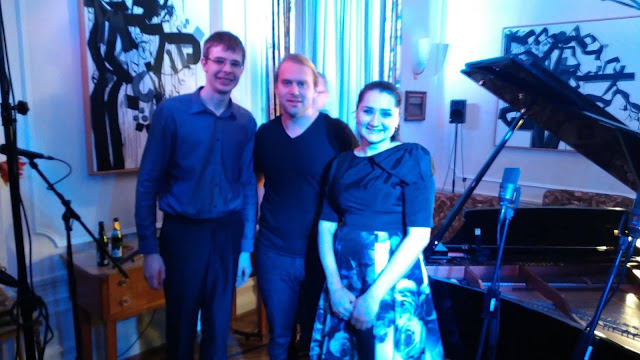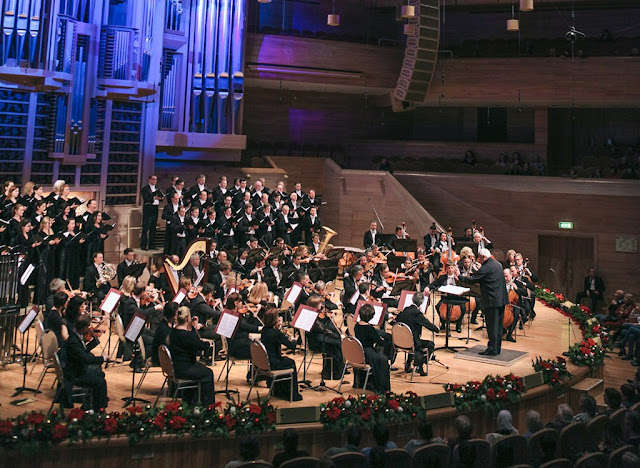Hello everybody. It is for me an honor and a pleasure to be able to interview a young Russian tuba player already established as one of the most relevant in his country and to make him known to the world.
I sincerely thank you for your friendship, your time and your collaboration with this interview project.
Without further ado, let's begin.
• Name and surname: Fedor Shagov
· What instrument / s do you use?
Tubas in F, Es, Bb.
· That make and model are the tools you use:
B&S 3100 WG JBL Classics, Bb Meinl-Weston Fafner MW195/2-OGB.
· That manufacturer and model are the / s nozzle / s you use:
I use the mouthpieces PT-85 and Jerome Wiss «Roland Szentpali» for F tuba. For Bb tuba I have 1AA.
Let's talk about your EDUCATION:
· When and where their studies or tuba euphonium started?
I started to play baritone at the music school of V.Blazhevic in Moscow.
· At what age?
At the age of eight.
 |
| With my best professor Andreas Martin Hofmeir and my wife Karina |
· What reasons or circumstances led him to study this instrument?
The brass band came to the elementary school with a concert.
I was impressed by the sound of the orchestra, the musicians allowed me to touch the instruments, it delighted me. Most of all, I liked the trombone, I wanted to play on one of these instruments. I asked my parents to take me to a music school.
· Who were your main teachers?
Professor Andreas Martin Hofmeir, who needs no introduction, and Professor Alexander Kazachenkov, soloist of the Bolshoi Theatre Orchestra of Russia.
As for his PROFESSIONAL EXPERIENCE:
Please leave us a little account of his experience as a soloist, a member of chamber ensembles, orchestra, band, etc.
· In Orchestra and / or Band:
State Wind Orchestra of Russia (2014-2017)
Moscow Symphony Orchestra "Russian Philharmonic" (2016-2017)
The State Symphony Capella of Russia, conducting by Valery Polyansky (2017 to now days)
 |
| My ensemble “Moscow Symphony Brass” |
I have played in many ensembles as a guest artist. On a regular basis, I play in the ensemble "Brass Soloists of Russia" conducting by Vladislav Lavrik. In the jazz ensemble "Boom Brass Band” In 2020, I founded the Moscow Symphony Brass quintet and we won the most prestigious competition in Russia. Now we are preparing programs for solo concerts.
· Solo concerts:
I play a lot of solo concerts in Russian cities, perform with symphony and brass orchestras, as well as with my wife, the pianist Karina Shagova. At the beginning of January, I made my debut with the organ in the Kaliningrad Cathedral. Due to the pandemic, I had to play two solo concerts in one day. It was interesting. We also managed to play concerts abroad several times, and the concerts at the Philharmonie of Baden-Baden with the symphony orchestra were one of the brightest impressions.
 |
| Solo performance with orchestra in the Great Hall of Moscow conservatory |
About your ORCHESTRAL EXPERIENCE:
• Tell us your experiences to access the orchestra place you currently occupy:
I was invited to play on the audition in the State Symphony Cappella of Russia. Before that, I worked in a brass band for several years and in the symphony orchestra for one year.
• How was the selection process?
The competition was held in two days and consisted of three stages. The first stage was the performance of the program with the concertmaster, on the second stage were the orchestral excerpts. The third stage was an audition in the orchestra.
• What works and / or orchestral solos were there as mandatory in the tests?
F Tuba:
M.Mussorgsky “The Pictures at an Exhibition”
G.Mahler Symphony 1, the third movement
R.Wagner Overture to the opera “The Nuremberg Meistersingers"
R.Wagner Einleitung zum dritten Akt der Oper “Lohengrin”
 |
| In orchestra |
Bb tuba:
S.Prokofieff Symphony 5
R.Wagner “Ritt der Walküre”
D.Shostakovich Symphony 5,
D.Shostakovich Symphony 7 (2 movement).
• Did you take any work of free choice? Which was?
No, it has not.
In another sense:
• How is your current work in the orchestra?
At the moment, we are staging operas by Giuseppe Verdi "Falstaff" and "Rigoletto", S. Rachmaninoff Symphony No. 2, K. Orff "Carmina Burana".
Before the pandemic, two big works were done: R. Strauss's "Alpine Symphony" and D. Shostakovich's "Symphony 4".
• Do you combine it with another musical group?
In addition to my work in the orchestra, I teach tuba and brass ensembles at the Chopin Moscow State College of Musical Performance and the Jazz Academy, as well as play in brass ensembles and give recitals.
• What recommendations would you give future Tubistas aspiring to an orchestral position?
It is necessary to study the orchestral excerpts, play them under the metronome, clearly observe the dynamics and strokes written in the musical text, listen to good recordings and try to play under them.
 |
| My festival “The Aura of the Tuba” |
Treating OTHER TOPICS OF INTEREST.
Here in Spain, in some centers the Euphonium is considered to be an instrument that should have its own specialization and, on the other hand, some believe that, as an instrumentalist, one should know and master the Tuba and Euphonium.
• Could you give us your opinion on this and how you would approach this topic in the interest of education and training adapted to the necessary specialization that is currently required worldwide?
In Russia, there are several performers on the euphonium, but there are no teachers-euphonists, this is not an independent subject. Children in music school begin to play the tenor or baritone, and as they grow older, they switch to the trombone or tuba. I believe that the specialty euphonium is necessary, since this instrument is becoming increasingly popular in the world and it should become an independent subject. But there is nothing wrong with a tuba player owning different instruments, it expands the horizons. I play euphonium, trumpet, and trombone.
• How do you see the tuba and euphonium teaching today and with a view to the future?
I hope that euphonium will become a separate specialty in many countries. For this requires professional teachers, exactly the euphonium players, but not the tuba players or the trombone players.
• Please tell us anything else that you consider of interest on this topic
We need manuals, schools, and a repertoire. And recently, the actual problem is live lessons, face to face. They are sorely missed.
Let's talk about your EXPERIENCE IN TEACHING:
· Tell us in which learning centers you have taught classes (visiting teacher, courses, master classes, etc.)
I travel a lot around the cities of Russia with master classes, and also conduct advanced training courses for teachers. I have private students from China, America, and Europe. I am a teacher at the Yuri Bashmet Educational Center.
· How do you organize your classes and the topic in general?
Since the time of the master class is limited, I immediately focus on the most noticeable problems and give several ways to solve them.
 |
| My pupils and students |
The lesson with my students lasts one hour twice a week, as well as another hour for the ensemble and orchestral excerpts.
· Do you think it is important for a student to make public presentations during their years of study? If so, how many times do you consider it appropriate and at what age or grade? Elementary, Professional, Superior?
Yes, absolutely. The concert is an integral part of our profession. It is very important to learn how to interact with the public, to be able to show the maximum possible at the moment. I believe that you need to perform at concerts at any age.
An important part of the course curriculum is standardized and based on the idea that the student masters the repertoire alone, sometimes to the detriment of the large group repertoire (Orchestra and Band), when in fact the majority of Tuba students and Bombardino are going to be teachers and / or members of a band and, to a lesser extent, of an orchestra in the case of the Tubas.
· In your opinion, how should this problem be addressed? How important do you think it is to include learning and mastery of the orchestral repertoire as part of the course curriculum?
During the study, the student must learn everything, regardless of what he chooses in the future. When I came to work at the college, the first thing I asked to introduce the subject of "learning a related instrument" and "orchestral excerpts" into the curriculum. This is important, because when applying for a job without preparation for the audition, a person finds himself in a stressful situation.

With my wife Karina and my professor in Russia Alexander Kazachenkov
· If I had to choose as a student (in a hypothetical situation), would you have a preference between a Tuba student and a Euphonium student?
I would probably prefer a tuba player, since I don't have enough knowledge of the euphonium repertoire.
About your DAILY WORK.
· What type of repertoire do you mainly work in?
Over the classical repertoire.
· What warm-up exercises do you use?
I use a variety of exercises for playing out, including playing long notes, working on techniques, strokes, scales and etudes.
 |
| XVI International Tchaikovsky competition, with my wife Karina Shagova |
TALKING ABOUT TECHNICAL ISSUES:
· Could you give us your opinion on the different concepts of sound and what characteristics define it, the articulation, the types of instruments, the literature, if the influence of language and musical tradition on sound is considered important and how to play?
The sound is our voice and it must be "born" in our head. I've been looking for my sound for a long time and I've been trying to make it a reality. In my opinion, fantasy and imagination are among the most basic moments in the formation of sound. As for the strokes and articulation, they depend on the music we play, on the style, the era, the composer. Staccato of Bach is different from the staccato of Shostakovich, and the music of the baroque is different from of the music of the romanticism.
· Tell us a bit about the manufacture of Tubas and / or Euphoniums and mouthpieces and tell us about your experiences and tastes of a particular manufacturer and why?
If we talk about tubas in F, for me is very comfortable to play B&S instruments. They have a very beautiful and gentle sound.
As for the B flat tuba, here I preferred Bb Meinl-Weston Fafner 195/2. The tuba has a very deep, voluminous and rich sound, there are no problems with intonation.
You are a recognized interpreter in you country.
Please tell us about the history of our instruments in your land.
In the last 20 years, Russia has increasingly played the tubas of well-known world manufacturers, especially the tubas in F. We have our own St. Petersburg’s factory, where produce the tubas (Bb, Es). In the professional orchestras still use the Bb tubas of Western representatives.
 |
| My portrait in the famous Hall of Moscow |
IN CONCLUSION:
· In your experience, do you think the diversity of performers, instruments and the opportunity to train in various specialized schools is homogenizing in interpretive centers already established? (Example: Russian, American, German-Austrian, English, etc.).
Each country has its own school, culture, and traditions. International communication and exchange of experience are of great benefit. But still, if everyone is the same, it will cease to be interesting.
Fedor, it´s a big pleasure and an honor to count on your experience, collaboration in this series of interviews and longtime friendship.
Thank you very much and my best wishes.
A big hug.


No hay comentarios:
Publicar un comentario